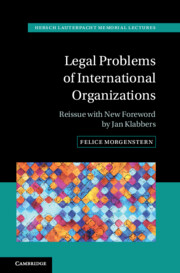Book contents
- Legal Problems of International Organizations
- Recent books in the Hersch Lauterpacht Memorial Lecture Series
- Legal Problems of International Organizations
- Copyright page
- Contents
- Foreword
- Preface
- Abbreviations
- Abbreviations of Organizations
- Table of Cases
- Introduction
- 1 The Legal Environment
- 2 Participation in International Organizations: Representation and Representativity
- 3 The Establishment of Standards of Conduct by International Organizations
- Conclusion
- Index
1 - The Legal Environment
Published online by Cambridge University Press: 15 February 2024
- Legal Problems of International Organizations
- Recent books in the Hersch Lauterpacht Memorial Lecture Series
- Legal Problems of International Organizations
- Copyright page
- Contents
- Foreword
- Preface
- Abbreviations
- Abbreviations of Organizations
- Table of Cases
- Introduction
- 1 The Legal Environment
- 2 Participation in International Organizations: Representation and Representativity
- 3 The Establishment of Standards of Conduct by International Organizations
- Conclusion
- Index
Summary
During the formative period of international organizations, attention was largely1 focused on their “internal” law, i.e. on their functions, powers and procedures under their constitutions and other rules. The assumption that international organizations do not have a common denominator encouraged such introspection. However — to misapply a famous quotation — no organization is an island, entire of itself. For their dealings with the outside world, whether in the sphere of public international law or in that of private law, the internal rules of organizations are relevant but not sufficient.2
- Type
- Chapter
- Information
- Legal Problems of International OrganizationsReissue with New Foreword by Jan Klabbers, pp. 3 - 47Publisher: Cambridge University PressPrint publication year: 2024



